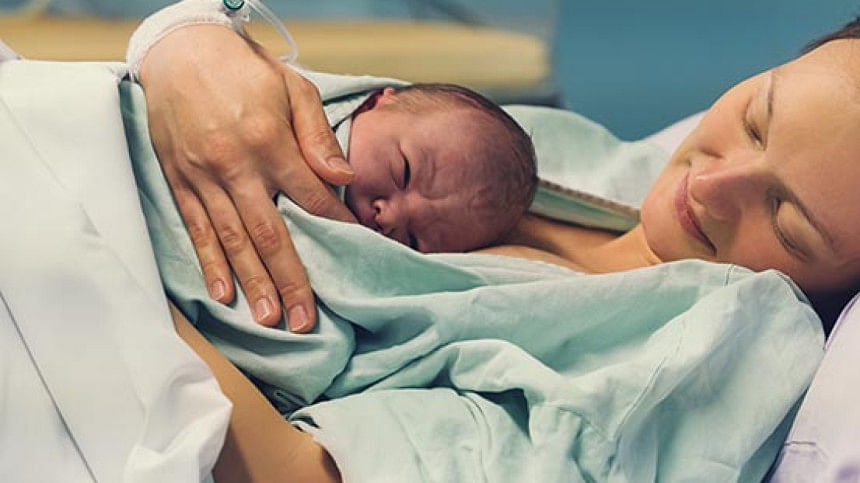In my arms, you thrive: saving newborn lives through KMC

Globally, 2.3 million children died in the first 28 days of life in 2022. There are approximately 6,500 newborn deaths every day, amounting to 47% of all child deaths under the age of 5 years.
The world has made substantial progress in child survival since 1990. Globally, the number of neonatal deaths declined from 5.0 million in 1990 to 2.3 million in 2022. Yet in 2022, nearly half (47%) of all deaths in children under 5 years of age occurred in the newborn period. Most neonatal deaths (75%) occur during the first week of life. The leading causes of death include premature birth, birth complications (birth asphyxia/trauma), neonatal infections and congenital anomalies. In Bangladesh the neonatal mortality rate wasnd to be 20 deaths per 1,000 live births (BDHS 2022).
Newborns, especially premature ones, are prone to developing hypothermia (low body temperature) from their deficient thermal insulation, as they have limited subcutaneous fat and sometimes a sudden exposure to the changes in the temperature in their surrounding environment.
Hypothermia is a major contributing factor to newborn illness, subsequent hospitalisation and even death. Hypothermia in newborns can have multi-organ involvements, such as heart-lung dysfunction, weakness, poor feeding, metabolic derangements resulting in low blood sugar levels, and life-threatening metabolic events. Their risk of mortality is five times more than newborns with normal body temperatures. Thus, preventing hypothermia is an essential part of newborn care.
To prevent such catastrophic hypothermia events, the World Health Organisation (WHO) recommends ensuring immediate Kangaroo Mother Care (KMC) for these newborns. Kangaroo Mother Care (KMC) is a method of caring for low-birth-weight and preterm infants by providing continuous skin-to-skin contact (by mother or even another carer) and support for breastfeeding. Infants receiving kangaroo mother care were found to show 40% less mortality than those who received conventional care in an incubator in hospitals.
The early KMC technique was first presented by Dr Rey and Dr Martinez in 1983 in Bogotá, Colombia, where it was developed as an alternative to inadequate and insufficient incubator care for premature newborns. Decades of research and development have documented that KMC lowers infant mortality and the risk of hypothermia and hospital-acquired infection, increases weight gain of infants, increases rates of breastfeeding, protects neuromotor and brain development of infants, and improves mother-infant bonding. Today, the WHO recommends Kangaroo mother care (KMC) for preterm or low-birth-weight infants should be started as soon as possible after birth.
To raise awareness and promote the practice of KMC, International Kangaroo Care Awareness Day is being observed globally on 15th May annually since 2011. The theme of this day in this year is "In My Arms, You Thrive". It ensures our commitment to protecting and nurturing every newborn through the power of our touch. It highlights the profound impact of KMC in promoting healing, stability, and lifelong well-being while honouring the clinicians, families, and communities that make it possible.
The writers are the assistant professors of Neonatology at the Institute of Child & Mother Health (ICMH), Matuail, Dhaka and public health specialist respectively. Email: [email protected], [email protected]

 For all latest news, follow The Daily Star's Google News channel.
For all latest news, follow The Daily Star's Google News channel. 



Comments